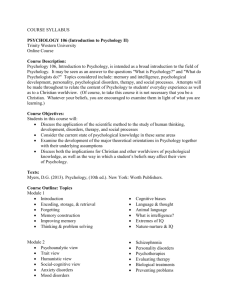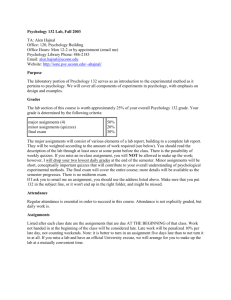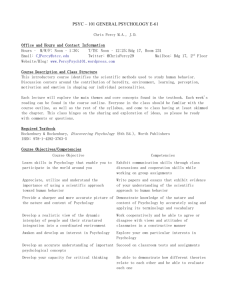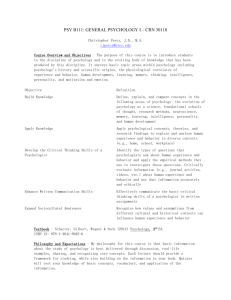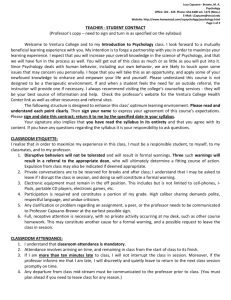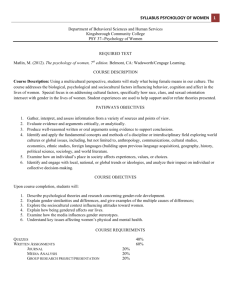COURSE SYLLABUS PSYCHOLOGY 106 IS (Introduction to
advertisement
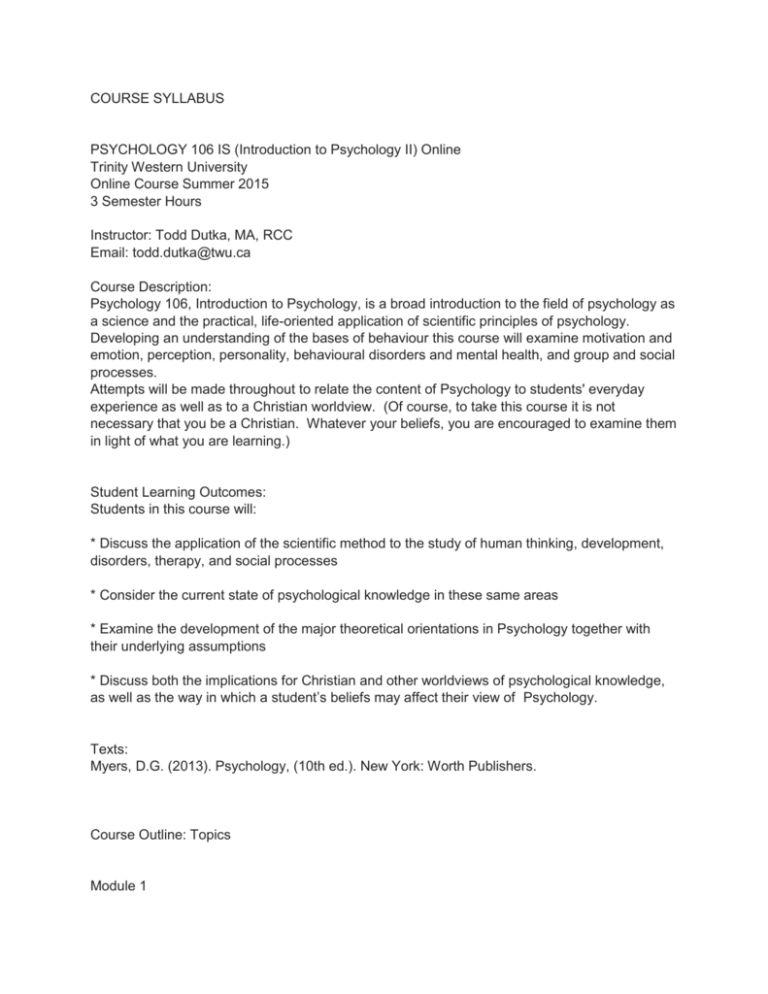
COURSE SYLLABUS PSYCHOLOGY 106 IS (Introduction to Psychology II) Online Trinity Western University Online Course Summer 2015 3 Semester Hours Instructor: Todd Dutka, MA, RCC Email: todd.dutka@twu.ca Course Description: Psychology 106, Introduction to Psychology, is a broad introduction to the field of psychology as a science and the practical, life-oriented application of scientific principles of psychology. Developing an understanding of the bases of behaviour this course will examine motivation and emotion, perception, personality, behavioural disorders and mental health, and group and social processes. Attempts will be made throughout to relate the content of Psychology to students' everyday experience as well as to a Christian worldview. (Of course, to take this course it is not necessary that you be a Christian. Whatever your beliefs, you are encouraged to examine them in light of what you are learning.) Student Learning Outcomes: Students in this course will: * Discuss the application of the scientific method to the study of human thinking, development, disorders, therapy, and social processes * Consider the current state of psychological knowledge in these same areas * Examine the development of the major theoretical orientations in Psychology together with their underlying assumptions * Discuss both the implications for Christian and other worldviews of psychological knowledge, as well as the way in which a student’s beliefs may affect their view of Psychology. Texts: Myers, D.G. (2013). Psychology, (10th ed.). New York: Worth Publishers. Course Outline: Topics Module 1 Thinking & problem solving Cognitive biases Language & thought Animal language What is intelligence? Extremes of IQ Nature-nurture & IQ Psychoanalytic view Trait view Humanistic view Social-cognitive view Module 2 Anxiety disorders Mood disorders Schizophrenia Personality disorders Psychotherapies Evaluating therapy Biological treatments Preventing problems Module 3 Motivation Work Emotions Stress Health Attribution & attitudes Conformity Compliance Obedience Attraction Prejudice Altruism Evaluation: A variety of evaluation methods will be used throughout the course. You will be able to choose from research papers, thought papers, analyses, and experiments. Some of these assignments will be worth more than others, but you will choose which ones to do. In addition, more traditional testing methods will also be employed (e.g., multiple choice questions). Finally, your active participation in online discussion is important and will also be considered in evaluation. The value of each will be as follows: Unit assignments 35% Quizzes (2 x 10) 20% Participation in online discussion 10% Final exam 35% TOTAL 100% Evaluation Details Unit assignments. Each chapter in the textbook covers a major topic in psychology. For each chapter unit you will have the option of choosing to do an assignment from among research papers, thought papers, analyses, and experiments. You will see that each assignment is worth from 20 to 50 points. You will need to choose a combination of assignments as you go through the complete course that adds up to 100 points (e.g., 20, 30, 50; or 20, 20, 20, 40, etc.). In other words, don’t do all the assignments! Choose. Your mark on these points will comprise the 35% of your total grade given for “unit assignments.” Be sure to integrate information from the textbook and, if applicable, additional sources, into your assignments. Please plan on submitting your first assignment by June 15, your second one by July 15, and your third by August 15. If you choose to do 4 or 5 assignments to make up your 100 marks, you can submit these by August 15 as well. Quizzes. A multiple-choice test will follow each third, or “module,” of the course. The first 2 will be shorter quizzes worth 10% each. They will cover only the material in that module (i.e., from the beginning for quiz 1, and from quiz 1 to 2 for quiz 2). Each quiz has a 30 minute time limit. The last test will be the final exam. It will cover the whole course and be worth 35%. Quizzes are based on the textbook. *Plan on taking each quiz/final exam around the same time that you submit your unit assignments (June 15, July 15, and August 15). Participation in online discussion. You are expected to comment in the online discussion forum. There are numerous discussion questions in the online lessons for you to give your response to. Equally valuable, you may respond to other people’s responses in the forum. You don’t need to respond to every question posed in the course materials; there are far too many. Try to make 3 comments (each about a paragraph long)per module (3 modules X 3 comments = 9 comments in total). Forum participation is analogous to class participation in the traditional face-to-face classroom. Emphasis (and marks) in the forums is on participation, not depth of knowledge. Final Exam. The final exam will be a multiple-choice exam of 100 questions. It will cover all of the chapters in the Myers textbook. The final exam has a 90 minute time limit. I will assign your work a letter grade first, and then in order to combine it with your other marks and reach a final grade, I will give it a numerical percentage according to the following scheme: 94-100 A+ 70-73 C+ 90-93 A 66-69 C 86-89 A- 62-65 C82-85 B+ 58-61 D+ 78-81 B 54-57 D 74-77 B- 50-53 D0-49 F
